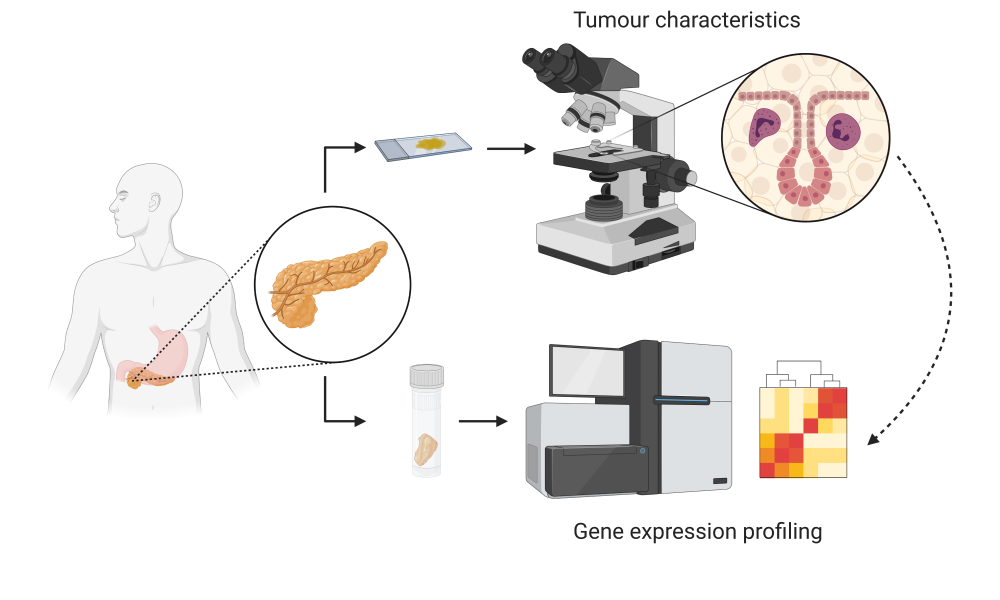
Gene expression analysis of pancreatic ductal adenocarcinoma (PDAC) tumours enables clinicians to stratify patients into molecular subgroups and select treatments that are best suited to each type; however, molecular subtyping remains cost-prohibitive and is not yet part of routine cancer care. In a new study, researchers used prior gene expression data to show that tumour characteristics can predict molecular subtypes, extending the benefit of gene expression analysis to patients for which it remains unavailable.
The study, published in the journal Cancer Medicine, was led by Dr. David Schaeffer, Associate Professor at the University of British Columbia and Head of the Department of Pathology and Laboratory Medicine at Vancouver General Hospital. The project was part of the Personalized OncoGenomics (POG) program at BC Cancer, a precision oncology initiative that performs whole genome and transcriptome sequencing to identify targetable genetic alterations in patients with metastatic disease, and a multi-site clinical trial called PanGen (Prospectively Defining Metastatic Pancreatic Ductal Adenocarcinoma Subtypes by Comprehensive Genomic Analysis).
PDAC is the most common type of pancreatic cancer, a disease that is the fourth leading cause of cancer-related death in Canada and has the lowest five-year survival rate—just eight per cent—of all major cancer types. Variability in treatment outcomes in patients with PDAC has been linked to differences in gene expression, and transcriptome analysis allows for molecular subtyping of patients based on gene expression profiles.
“As molecular subtypes have prognostic significance independent of clinical prognostic factors such as grade and stage, the application of molecular classifiers to individual tumours has the potential to further refine prognostication and inform patient management,” write the authors. “Molecular stratification of tumours may also play a future role in treatment selection.”
Much of the information about PDAC gene expression profiles has been gleaned from clinical research programs like POG and PanGen; molecular subtyping has not yet been implemented into routine clinical workflows for large patient populations. Dr. Schaeffer and his group aimed to amplify the knowledge gained from prior transcriptomic analyses of PDAC tumours by correlating tumour characteristics to molecular subtype, allowing for the stratification of patients in the absence of tumour sequencing.
The researchers analyzed tissue samples from patients who had already undergone transcriptome analysis through the POG program. They investigated several parameters and found that the infiltration of immune cells called neutrophils and the formation of structures called glands were the best predictors of molecular subtype, with low neutrophil infiltration and gland formation being strongly correlated with shorter survival. The researchers validated these finding using digital slide data and clinical information from PDAC cases in The Cancer Genome Atlas (TCGA).
“The association of neutrophil infiltration and gland formation with molecular subtype proved robust across inhouse (POG) and external (TCGA) cases, frozen tissue and formalin-fixed paraffin embedded (FFPE), primary and metastatic sites, and digital and glass slides, such that our findings are generalizable to a wide variety of sample types,” write the authors.
While implementation of whole genome and transcriptome sequencing into routine cancer care remains a long-term goal, the correlation of tumour characteristics with molecular subtypes provides an avenue for clinicians to better manage patient treatment strategies and extends the benefit of cancer genomics research to cancer patients today.
Julia R Naso, James T Topham, Joanna M Karasinska, Michael K C Lee, Steve E Kalloger, Hui-Li Wong, Jessica Nelson, Richard A Moore, Andrew J Mungall, Steven J M Jones, Janessa Laskin, Marco A Marra, Daniel J Renouf, David F Schaeffer. 2020. Tumor infiltrating neutrophils and gland formation predict overall survival and molecular subgroups in pancreatic ductal adenocarcinoma. Cancer Medicine. Online ahead of print.
Learn more about the Personalized OncoGenomics program.
Learn more about Cancer Genomics.
Learn more about Pancreas Centre BC.